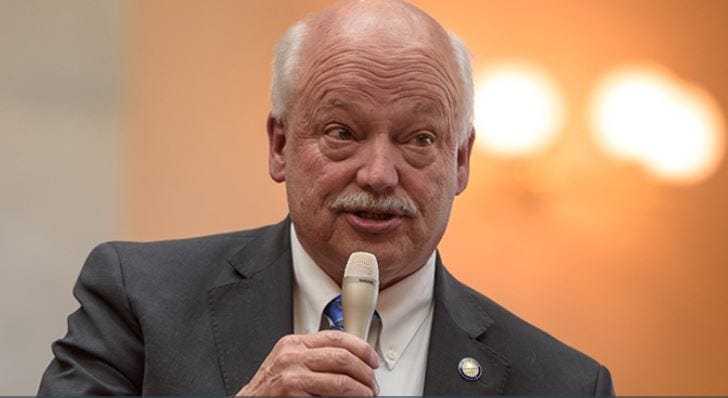Legislation aimed at better protecting patients from sexually abusive medical professionals such as Dr. Richard Strauss was unanimously passed by the Ohio Senate and is headed to the House.
Senate Bill 109, proposed by State Sen. Bob Hackett, R-London, and approved by Ohio senators April 24, would require doctors on probation for sexual misconduct to notify their patients in writing. It would also allow the State Medical Board of Ohio to act more quickly when a physician is accused of sexual misconduct and would require prosecuting attorneys to notify the board if a doctor is convicted or pleads guilty to a specific felony or misdemeanor in court.
Read More: State medical board failed to protect Ohioans from doctors’ sexual misconduct
The bill’s passage comes six years after it was revealed that the medical board had ignored a previous complaint made against Strauss. Strauss, who died by suicide in 2015, was accused of sexually abusing at least 177 former students and athletes at Ohio State University.
“Ohioans were not happy with what happened with Dr. Strauss and so we gave the medical board more authority on this,” Hackett told The Dispatch. “Everybody knows it’s a situation where we need to move quicker. Dr. Strauss abused a number of citizens and we definitely don’t want that to happen again.”
The legislation was reintroduced in 2023 and again in 2024 in the Senate following a Dispatch investigation of the State Medical Board of Ohio and its handling of sexual misconduct allegations against physicians throughout 42 years. From 1980 through 2022, at least 256 Ohio doctors have faced disciplinary action for sexual misconduct. Of those doctors, 199 sexually abused or harassed 449 patients, The Dispatch revealed.
Two doctors were among lawmakers who voted in favor of the bill, including both Sen. Terry Johnson, R-McDermott, and Sen. Stephen Huffman, R-Tipp City.
When reached by phone Tuesday, Huffman told The Dispatch he thought the legislation should have been passed sooner. Most bills spurred by an incident are introduced and passed into law within a year or two rather than the six it took from when the Strauss scandal came to light in 2018, Huffman said.
Still, the senator said he believed the legislation would increase transparency at the medical board and eliminate “some loopholes and gray areas” that existed when a complaint was first filed against Strauss in 1996.
“We want to keep bad physicians, bad providers out of the profession and give the medical board the tools that it needs to do that,” Huffman said.
Although the bill was approved unanimously in the senate, it’s unclear how it will fare in the house. Hackett said he expects it to win approval within a month or two, if not then by the end of the year. Gov. Mike DeWine has already expressed his support for the legislation.
In the Senate, no one testified in opposition of the bill before it passed and just two people spoke in favor of it.
One proponent was medical board executive director Stephanie Loucka, who told The Dispatch via email that the board would “look forward to working with the House of Representatives to help move the bill forward to become law.” The other proponent was Leanna Rocheleau, 37, of Johnstown, who told legislators she was sexually assaulted by a massage therapist in August 2021.
Rocheleau told legislators that it took a year-and-a-half for the medical board to begin investigating the massage therapist she accused and another year-and-a-half before an investigation was completed. Rocheleau said she decided to use the pain she suffered as a result of her assault to push for change like Senate Bill 109.
“I transformed from victim to survivor… To find healing through justice reform. To give my traumapurpose. To deeply comprehend the wrong and work towards making it better for my kids,” she told the legislature. “That is my mission now. I won’t let them forget me.”
mfilby@dispatch.com
@MaxFilby
This article originally appeared on The Columbus Dispatch: Law proposed after Ohio State’s Strauss scandal closer to becoming law
